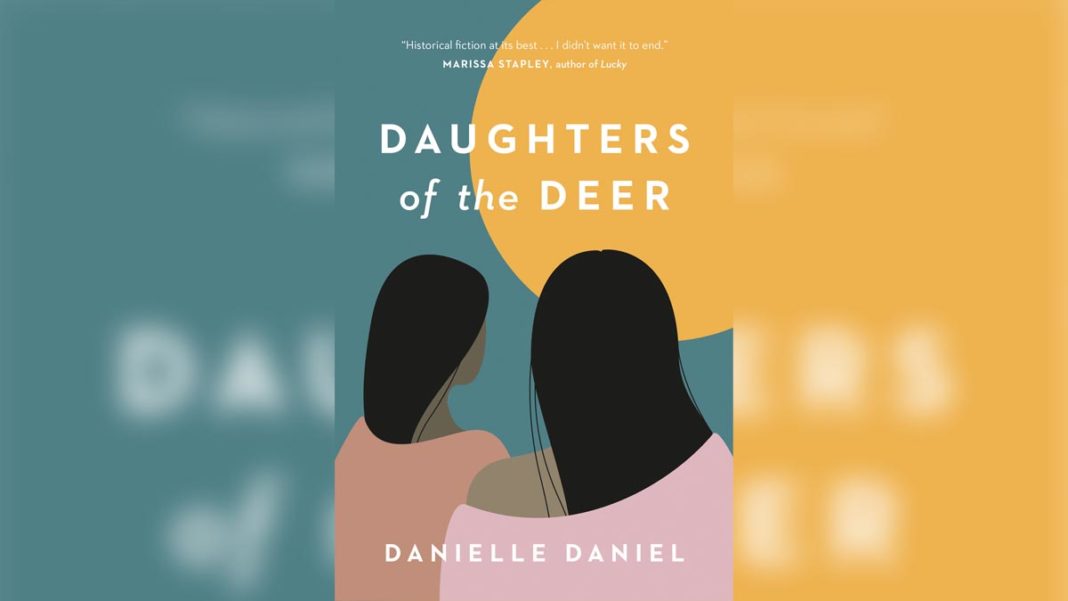MANITOULIN—Manitoulin author Danielle Daniel recently launched her first adult novel, and the book has made the bestseller list for five weeks now. Inspired by Ms. Daniel’s own ancestral link to a young girl murdered by French settlers, ‘Daughters of the Deer’ is a haunting work of historical fiction that brings to life the lives of vulnerable women in the Algonquin territories of the 1600s, while also exploring themes of identity in 2SLGBTQ+ and racialized communities and their intersections.
The story begins in the year 1657. Marie is a gifted healer of the Deer Clan who does not want to marry the green-eyed soldier from France who has asked for her hand. Her people have suffered deep losses from the Iroquois and are threatened by disease and starvation. She cannot refuse her chief’s request that she accept the white man’s proposal in order to help her people.
Marie and Pierre’s eldest child, Jeanne, is caught between worlds, neither white nor Algonquin. Aged 17 years and unmarried, Jeanne’s father must pay a hefty fine to the French crown until she is married. Tragically, Jeanne is in love with Josephine, a sin to the settlers of New France and even to her own father. Among her mother’s people, she would have been blessed, her two-spirited nature a sign of special wisdom.
The cultural divide is very evident in this story. At one point, Marie tells Pierre the French are taking too much from the land and are disrespecting the sacred gift of the moose. He doesn’t understand, until perhaps it is too late. Details of the connection between Marie’s people, the Weskarini, and the land are woven throughout the book. This theme of broken connection and our failure to respect nature are very much represented in environmental and climate change issues of today.
Danielle Daniel is an award-winning author and illustrator, with two previous picture books and a middle-grade novel (set in Sudbury) under her belt. Her picture book, ‘Sometimes I Feel Like a Fox’ is a Best 100 title at the New York Public Library and winner of the Marilyn Baillie Picture Book Award. ‘You Hold Me Up’ was shortlisted for the same award.
Ms. Daniel shared some insights on her novel in a recent Q&A session with The Expositor.
The Expositor: This is your first adult novel. You have previously written books for children and middle-school readers. I understand it was inspired by one of your own ancestors. What made you choose this particular story and adult readers?
Danielle Daniel (DD): I never intended to write an adult novel. But when I learned about Jeanne, the daughter of an Algonquin ancestor who was murdered by French settlers, I could not stop thinking about her. And thinking about the way similar violence is still with us after almost 400 years. I carried her with me for months and months as I went about my day. I wanted to get closer to the kind of life she must have lived, but I could not find any other novel written about that time period that portrayed the lives and experiences of Indigenous women, and from their point of view. Finally, though I’d never written a novel before, I felt like I had no choice: I had to give voice to Jeanne and to Marie, her mother.
Expositor: This story is written from several viewpoints, with Marie being the thread that holds the story and the character’s lives together. Can you tell me about the story and why you chose these viewpoints?
DD: Marie’s voice was clear to me, almost from the beginning. Though what happened to Jeanne was what first haunted me, it was Marie, my Algonquin foremother, who led me forward. It was through her eyes and her heart that I found a way to imagine the world of the novel. It also felt important to include her settler husband’s perspective, though Pierre’s narrative became the smallest piece of the finished book. I had to write my way through the story as understood by Marie, and by Pierre, to be able to see and feel Jeanne more clearly. Jeanne’s sections are the last I wrote.
Expositor: ‘Daughters of the Deer’ takes us back to the early roots of colonization, and its particularly harsh impact on Indigenous women, especially violence and property ownership, both modern issues still. Can you talk about the connection between your story and modern day issues, such as Missing and Murdered Indigenous Women and Girls?
DD: There was so little in the historical record of that time that put faces and names to Indigenous women, never mind the atrocities that occurred. The roots of violence against Indigenous women and girls extends from these early days of colonization. The destruction of the land is directly linked to the destruction of a People, and especially its most vulnerable, women and 2SLGBTQ+. Settlers stripped power away from a People by ripping a People away from their place and stripping away their culture, language and identity. The novel zooms in on one marriage, a first forced marriage between a First Nations woman and a French soldier turned settler, and the mixed-race children they bring into the world, and all the terrible forces that led to the murder of their daughter by forces. By bringing them to life, I hope to show readers how we got here, and while the crisis of violence is still ongoing.
Expositor: Can you touch on the tragedy of 2SLGBTQ+ characters in the story and why this was important to you in writing this story?
DD: Before colonization, First Nations saw 2SLGBTQ+ people as possessing special and unique wisdom, with distinct gifts to offer their tribe. They were recognized as having enhanced abilities. 2SLGBTQ+ people were deeply valued and respected. I wanted to explore this clash between cultures in my novel because in our current society, 2SLGBTQ+ people continue to be most at risk for violence. By illustrating this collision though the eyes of Marie, I could show this great suppression of a deep and accepted love that was revered before the priests arrived. And, more specifically, how it brutally affected their daughter Jeanne, caught between two worlds.
Expositor: It’s a moving story that subtly touches on themes of exploitation, racism, colonization as well as strength and resilience. What would you like readers to take away from this? What is the conversation you’d like to start?
DD: Writers often write to fill a gap they see in the world. I wanted to imagine my way into the lives of my ancestors, Marie, an Algonquin woman and Pierre, a French settler, and their first-born daughter, Jeanne. ‘Daughters of the Deer’ is an origin story for all of us living on Turtle Island. It is one family’s story which represents so many other untold stories of women, hurt by the hands of men who landed on their shores and refused to go home. As a writer and a mother who deeply cares about reconciliation and honouring the structural and systemic changes needed to restore power, restitution and healing in this country, I hope that readers will come away feeling more empathy and understanding for the Indigenous women who came before us. I hope they will remember their strength and resilience too. And just maybe, they will feel Marie and Jeanne, as I do, when they walk on this land.
‘Daughters of the Deer’ is published by Random House Canada and is available online and will soon be available in The Expositor’s bookstore, Print Shop Books.




